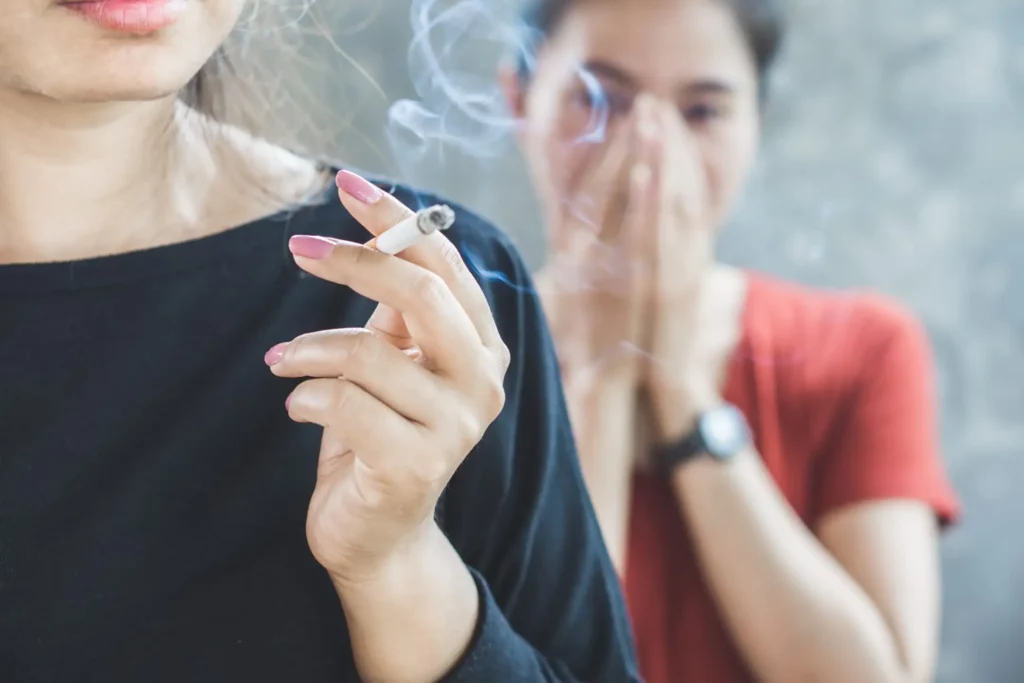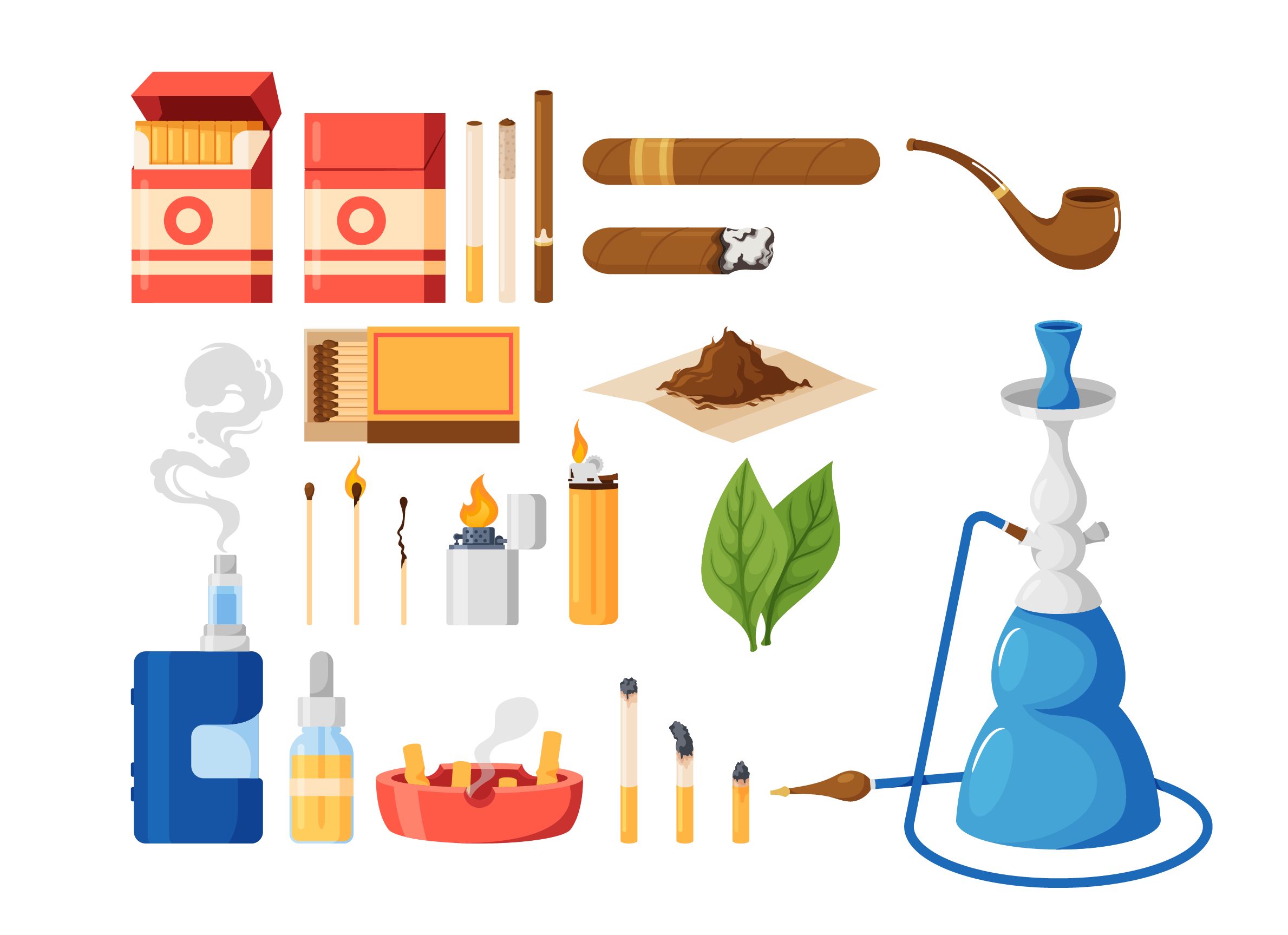Introduction
The harmful chemicals in tobacco smoke can cause long term health problems. It is important to know what smoking does to your health so you can be fully informed and make your own decisions about whether you choose to smoke.
Smoking of any kind (cigarettes, e-cigarettes (vapes), shisha, joints, pipes and others) has an impact on your body and mind.
Lungs aren’t adapted to inhale anything but fresh air.
Many chemicals added to smoking products are harmful, addictive and toxic for your body.
Nicotine is the addictive ingredient in both tobacco in cigarettes and the liquid in vapes. It’s what makes people keep smoking or vaping. One of the most addictive substances in the world is nicotine.
Nicotine addiction (also known as nicotine dependence) can develop quickly. The more a person vapes or smokes, the more their brain and body gets used to the substance and the harder it is to stop.
Reasons people smoke
Lots of reasons can lead people to consider smoking. It’s important to know about how smoking impacts your health
People might choose to start smoking for different reasons, including:
- Being pressured or wanting to fit in with friends,
- To deal with stress and emotional troubles,
- They may have seen their family or adults around them smoke,
- Curiosity of what it feels like.
Whatever a young person’s reason is for taking up smoking or vaping, it is important that everyone know the risks involved in doing so.
Quitting smoking or vaping
No matter your age, smoking and vaping are dangerous to everyone’s health. This is because your body and mind can become dependent upon nicotine which can be hard to give up. NSW Youth Health Services might have additional supports to help with quitting such as support programs for quitting that are designed for young people or access to free Nicotine Replacement Therapy (NRT).
NSW Health has also worked with people aged 14-24 years to build a free app called Pave, designed to help people become vape-free. Pave offers progress tracking, advice for every step of the quit journey, distractions for when cravings hit, and activities that help you navigate common barriers to quitting.
Download Pave for free from Apple and Android app stores.
If you decide you want to quit, here are some tips to help:
- Try reaching out to a health provider such a NSW Youth Health Service
- Think about the reasons you don’t want to smoke or vape.
- Be empowered by your own decision not to smoke or vape.
- If you’re worried about someone around you pressuring you to smoke or vape, think about what you will say before you’re offered a cigarette or vape. You could say something like ‘I just don’t feel like one right now.’
- Support the other people around you to stop or reduce smoking or vaping.
- Avoid situations where cigarettes or vapes might be around or offered.
- Choose to do something else when others start smoking or vaping.
- Practice quitting smoking or vaping. Not everybody can succeed the first time and that’s okay – pick yourself up and try again!
How is smoking harmful?
It is important to look after your body. The damage caused by smoking at a young age can impact your life long-term. The chemicals in tobacco and other smoke can damage your body in many ways.
For example:
- Nicotine is the addictive ingredient in tobacco and nicotine juices used in vapes. Research shows that young people become addicted to nicotine at a much faster rate than adults.
- Nicotine narrows your veins and arteries. This can damage your heart by forcing it to work faster and harder and slow your blood, reducing oxygen to your feet and hands.
- There are chemicals in cigarettes and vapes that cause inflammation in your body and impair the immune system.
- Second-hand smoke from cigarettes or vapes (other people breathing in the smoke) can cause the same harm to people around you. It’s important not to smoke around those most vulnerable, like children, babies, pregnant women and the elderly.
- Smoking and vaping while pregnant increases the chance of development issues for the baby.
Learn more about smoking tobacco and nicotine and the impacts on your body at Your Room and the Alcohol and Other Drug Foundation website.
Vaping
E-cigarettes or vapes are battery-powered smoking devices that create vapour from heated liquids (sometimes known as vape ‘juices’ or oils, e-juice or vape liquid). Using an e-cigarette is often called ‘vaping’.
Vape aerosol is not water vapour. The main ingredient in vapes is propylene glycol, vegetable glycerine or glycerol
Vapes can contain the same harmful chemicals found in cleaning products, nail polish remover, weed killer and bug spray – they just don’t put them on the pack.
Vapes come in a number of flavours such as blueberry or bubble-gum that make them appealing. Many vapes also contain nicotine, the same highly addictive substance found in tobacco cigarettes.
Research suggests that young people can become more easily addicted to nicotine than adults. and that nicotine can harm the brain during adolescence and young adulthood until about age 25.
Testing has shown that vapes labelled ‘nicotine-free’ often have high nicotine levels. This has resulted in people thinking they are using nicotine-free vapes and can unknowingly quickly develop a nicotine addiction.
Get the facts about vaping here.
Just like cigarettes, selling vapes or e-liquids to people under 18 years of age is banned regardless of whether the product contains nicotine or not.
People over the age of 18 can purchase vapes at pharmacies and can then purchase specified vapes at pharmacies.
To find out more about quitting:
- Download the free Pave app from Apple and Google Play stores.
- Call Quitline on 13 78 48 for private and non-judgemental support on which methods would suit you best.
- Go to iCanQuit, an interactive website that allows smokers to share their stories about their experience with quitting.
- Or request a call back from iCanQuit who has Aboriginal and multi-lingual advisors.
Your Room and the NSW Health website have more information on e-cigarettes and vapes.
Shisha
Shisha tobacco is also dangerous for young people because nicotine, as well as many other chemicals can be found in Shisha tobacco. As a result, smoking Shisha is just as harmful to the body as cigarettes and vaping. People often unknowingly smoke much higher amounts of tobacco and nicotine through Shisha pipes. You can find out more about Shisha at Shisha No Thanks.
What’s the law on smoking?
If you are under 18 years old, it is illegal for anyone to sell you any kind of nicotine including cigarettes & vapes.
It is illegal to smoke and vape in all enclosed public areas and certain outdoor public areas such as:
- public transport stops,
- commercial outdoor dining areas,
- public swimming pools,
- near children’s play equipment.
Also, it is illegal to smoke and vape in a car with a minor under the age of 16.

There are also bans in place that relate to retailers who sell vapes. These laws are in affect for retailers. While they do affect the public, the penalties apply toward the retailer. Some of these include:
- A ban on the sale of tobacco products, non-tobacco smoking products, e-cigarettes and e-cigarette accessories to anyone under 18
- A ban on the display of tobacco products, non-tobacco smoking products, smoking accessories, e-cigarettes and e-cigarette accessories in shops
- All tobacco sold must be packaged correctly with appropriate health warnings
The laws around smoking change as new research and trends emerge. For a better understanding of the laws, make sure to visit NSW Health and Youth Law Australia, who have more information about the laws around smoking.
Resources to help you quit
Quitting smoking or vaping can be hard, and you don’t have to do it alone. Here are some resources to help you quit:
- NSW Health worked with people aged 14-24 years to build a free app called Pave, designed to help people become vape-free. Download Pave for free from Apple and Android app stores.
- The Australian Government Department of Health has an app designed to help people quit called MyQuitBuddy.
- Quitline (13 78 48) has counsellors trained in supporting people to quit smoking.
- Talk to your GP
- NSW Health – Vaping quit support factsheet
- Be Smoke-Free has a planning platform to help people quit
- Koori Quitline NSW (13 78 48) have support services for Aboriginal and/or Torres Strait Islander young people to start their future without smokes.
- I Can Quit has resources to help you on your journey to quit for good
- WellMob has cultural resources and support for Aboriginal and/or Torres Strait Islander people.
